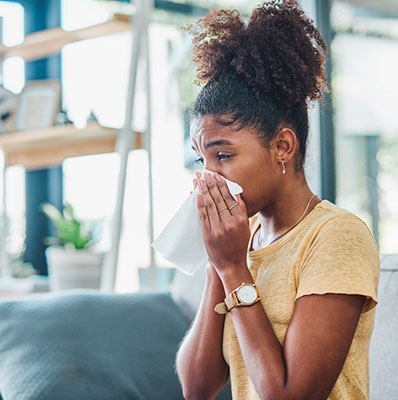Air Quality & Your Health: Understanding the Risks and Safety Tips

June 08, 2023
Skies are hazy, and it smells like a bonfire. Is this dangerous to breathe?
Air quality plays an important role in our overall health and well-being. The quality of the air we breathe can significantly impact our respiratory system, cardiovascular health, and overall quality of life.
Pulmonologist, Aida Capo, M.D., explains the risks of exposure to poor air quality, signs of overexposure, treatment options and essential tips to stay safe during times of compromised air quality.
Risks of Exposure to Poor Air Quality
Exposure to poor air quality, especially over a prolonged period, can have several harmful effects on our health.
"The immediate health risks are worsening of asthma and allergy symptoms,” Dr. Capo explains. “Inhaling polluted air can introduce harmful substances into our lungs and bloodstream, leading to various health issues."
Some of the risks associated with poor air quality include:
- Respiratory problems: Pollutants in the air, such as particulate matter and nitrogen dioxide, can trigger or worsen respiratory conditions like asthma, bronchitis, and chronic obstructive pulmonary disease (COPD).
- Cardiovascular issues: Studies have shown a link between poor air quality and an increased risk of heart attacks, strokes and other cardiovascular problems.
“Everyone needs to be cautious of poor air quality, but those with even greater risk are children, older adults, those who are pregnant and those with existing heart conditions, respiratory conditions or lung disease,” adds Dr. Capo.
Signs of Overexposure
Recognizing the signs of overexposure to poor air quality is crucial for taking timely action. Some common symptoms you may experience are:
- Respiratory symptoms: Shortness of breath, coughing, wheezing, chest tightness and increased mucus production.
- Cardiovascular symptoms: Irregular heart rhythms, chest pain, palpitations and elevated blood pressure.
- Allergic reactions: Sneezing, runny or congested nose, itchy or watery eyes and skin rashes.
- Other general symptoms: Fatigue, headaches, dizziness, and difficulty concentrating.
“For most, these symptoms will go away when air quality improves, but if you have concerns, contact your doctor,” says Dr. Capo. “If you have lung disease or heart disease and are experiencing emergency symptoms like shortness of breath, chest pain or unusual fatigue, seek emergency care right away.”
How to Stay Safe During Poor Air Quality
When air quality is compromised, taking preventive measures can significantly reduce your exposure to pollutants.
Minimize Outdoor Exposure
Reducing your time outdoors when air quality is compromised can significantly reduce your exposure to pollutants. Follow these guidelines:
- Limit outdoor activities: Plan outdoor activities for times when air quality is better.
- Stay indoors: Create a safe haven by keeping doors and windows closed. Use air conditioning or air purifiers with HEPA filters to improve indoor air quality.
- Maintain physical activity: If exercising outdoors is part of your routine, consider shifting your workout to indoors – you can do activities that don’t require equipment like squats, lunges, or pushups, or follow along to an online fitness video.
Use Protective Equipment
When air quality is severely compromised, or if you have existing respiratory conditions, wearing appropriate protective equipment can provide an additional layer of defense against pollutants.
Consider the following:
- Respiratory masks: N95 or N99 masks can effectively filter out a significant portion of airborne particles. Ensure a snug fit and follow proper usage guidelines for optimal protection.
- Eye protection: Wear sunglasses or protective goggles to shield your eyes from irritants and airborne allergens.
Promote Indoor Air Quality
Improving indoor air quality is crucial during times of compromised outdoor air. Take the following measures:
- Avoid smoking using fireplaces and burning candles: Smoking and burning candles release harmful chemicals into the air. Refrain from these activities to maintain clean indoor air.
- Do not vacuum: vacuuming stirs up particles already inside your home.
- Use the AC: If an air conditioner is available, run it while keeping the fresh-air intake closed and the filter clean to prevent outdoor smoke from getting inside.
Stay informed
- Check Air Quality Index (AQI): Regularly monitor the AQI provided by local authorities or reputable websites. This index categorizes air quality into different levels, helping you gauge the severity of pollution.
- Follow health advisories: Stay updated on health advisories or alerts issued by relevant authorities. These advisories may recommend specific actions to protect yourself during periods of poor air quality.
Next Steps & Resources:
- Meet our source: Aida Capo, M.D.
- To make an appointment with Dr. Capo or a doctor near you, call 800-822-8905 or visit our website.
The material provided through HealthU is intended to be used as general information only and should not replace the advice of your physician. Always consult your physician for individual care.





